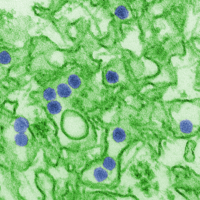
Photo from wikipedia
This study aims to analyze the potential impact of taking care of a child with congenital Zika virus syndrome (CZS) on the mental health of parents. Specifically, three objectives were… Click to show full abstract
This study aims to analyze the potential impact of taking care of a child with congenital Zika virus syndrome (CZS) on the mental health of parents. Specifically, three objectives were formulated: (a) to assess the level of mental health of the parents; (b) to examine the influence of subjective well-being and fatigue as predictors of parents’ mental health; and (c) to identify the impact of sociodemographic variables on parents’ mental health. Sixty-nine mothers (Mage = 26.38; SD = 6.23) and 17 fathers (Mage = 31.41; SD = 7.57) of children diagnosed with CZS took part in this study. They answered a questionnaire containing measures of positive and negative affects, life satisfaction, fatigue, mental health, as well as sociodemographic questions. The results indicated that approximately 7% of the participants had low levels of mental health and probable emotional disorder. In addition, higher levels of fatigue and negative affects and lower levels of life satisfaction significantly predict a lower level of mental health. Finally, comparative analysis showed significant differences between fathers and mothers: mothers reported experiencing fewer positive and more negative affects, a lower level of satisfaction with life, a higher level of fatigue and worse mental health. In summary, this article presents an overview of the mental health of mothers and fathers of children with CZS and points the way to devising strategies for psychological intervention that promote the adaptation of parents to this kind of developmental disability in the family.
Journal Title: Journal of Child and Family Studies
Year Published: 2018
Link to full text (if available)
Share on Social Media: Sign Up to like & get
recommendations!